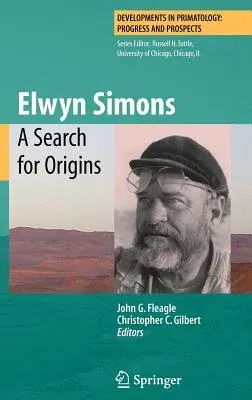Elwyn Simons has held professional appointments at Yale University
(1960-1977), Duke University (1977-present), and was the Director of the
Duke Primate Center (1977-1991) and Scientific Director (1991-2001). He
has authored nearly 300 scientific publications and is the holder of
many high honors. He is a member of the United States National Academy
of Sciences, the American Philosophical Society, as well as many other
professional associations. He was elected a "Knight of the National
Order" by the government of Madagascar and has been the recipient of
many awards including the prestigious Charles R. Darwin Award for
Lifetime Achievement from the American Association of Physical
Anthropologists.
For nearly a half century, Dr. Simons has dominated the study of primate
evolution. The volume summarizes the current state of knowledge in many
aspects of primate and human evolution that have been studied by Simons
and his colleagues and place it in a broader paleontological and
historical perspective. Elwyn Simons: A Search for Origins contains the
results of new research and reviews of many of the critical issues in
primate and human evolution during the last half of the twentieth
century as well as aspects of African paleontology and primate
conservation in Madagascar. The authors are an extremely distinguished
group of international authorities on all aspects of primate and human
evolution and primate behavior.
Although linked primarily by their connection to Simons' own career, the
chapters include a wide range of important new works that are valuable
contributions to the field of physical anthropology and paleontology and
are certain to be widely cited and used in teaching. Several of the
papers (Simons et al., Wing et al., Seiffert et al., Gingerich,
O'Conner) are broad reviews of the history of research and discoveries
in the fossil deposits of the Fayum, Egypt that have formed the
background of our understanding of anthropoid evolution for over a
century and will be important researchers for students and researchers
in primate evolution and African paleontology. Similarly, broad reviews
of the history of primate paleontology and human evolution (Rasmussen,
Pilbeam, Wood; Sussman and Hart) will be essential reading in courses in
primate and human evolution as well as the history of physical
anthropology. Other authors describe new research results on early
anthropoid fossils from Egypt (Kay and Simons) Tanzania (Stevens) and
Myanmar (Gunnell and Ciochon). The chapter by John Oakley, Professor of
Law at the University of California addresses the challenges to the
teaching of evolution in schools- both public and universities world
wide.
Another major focus of several chapters are the primates of Madagascar.
Two chapters are reviews of the extraordinary radiation of fossil lemurs
(Godfrey et al, Jungers et al.). Two review the behavior and
conservation of living lemurs (Taylor and Wright) and the chapter by
Tattersall bridges the two major sections of the book by discussing
about the biogeographic history of Malagasy mammals.

